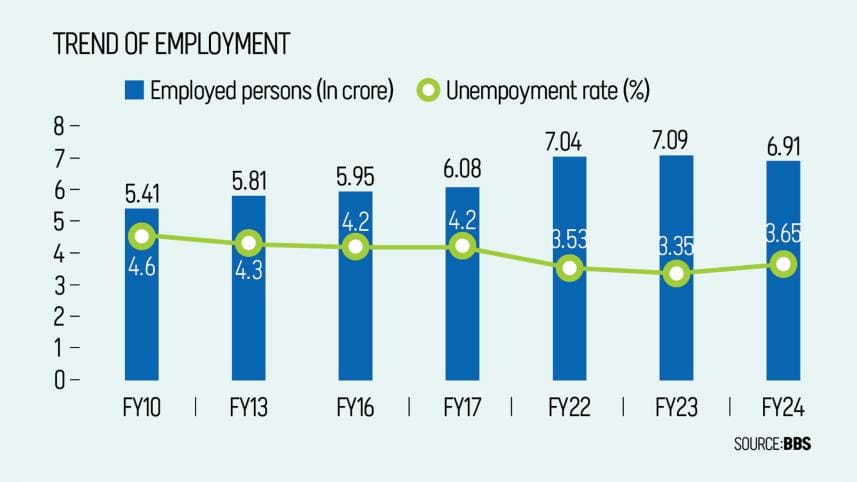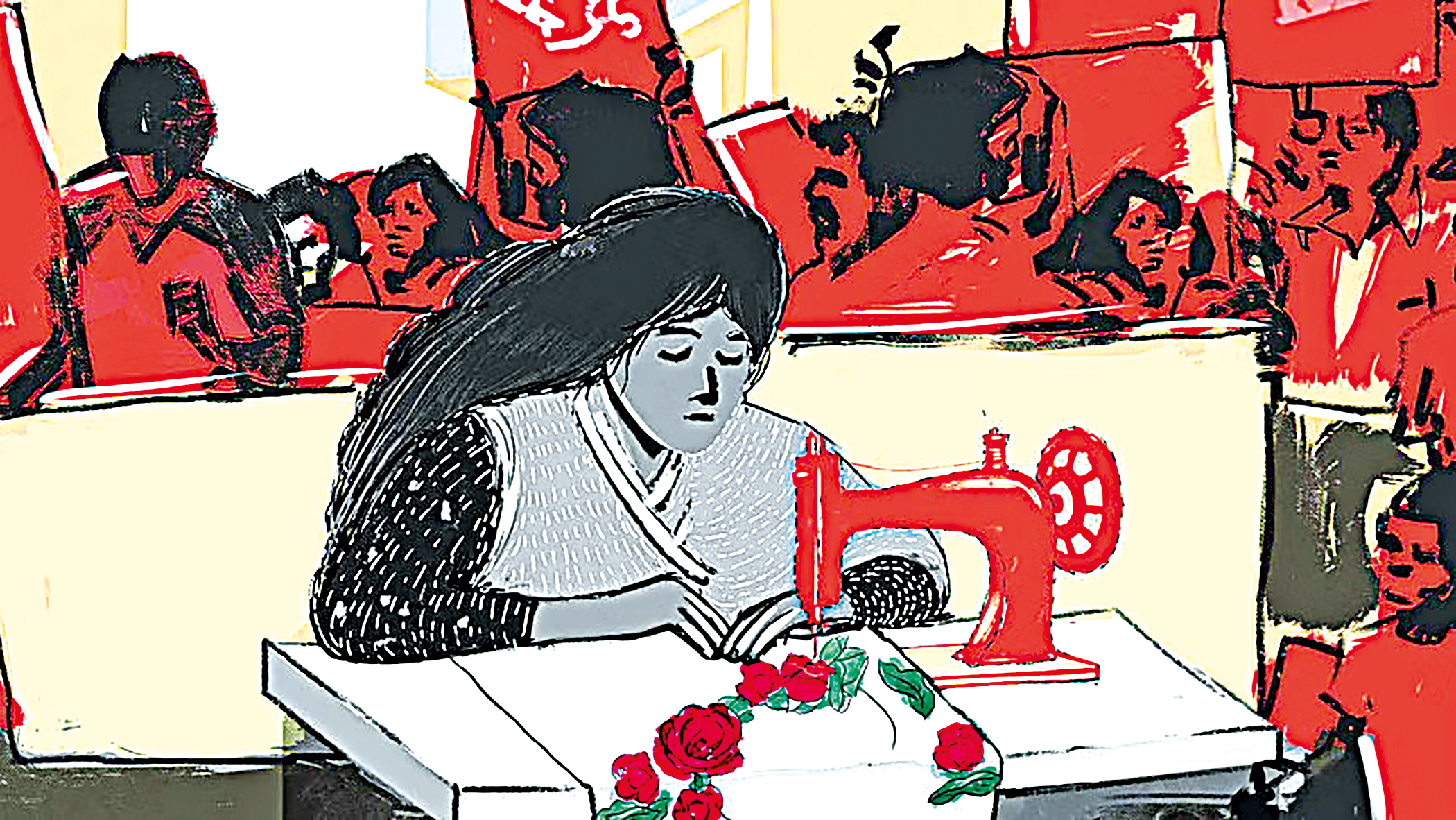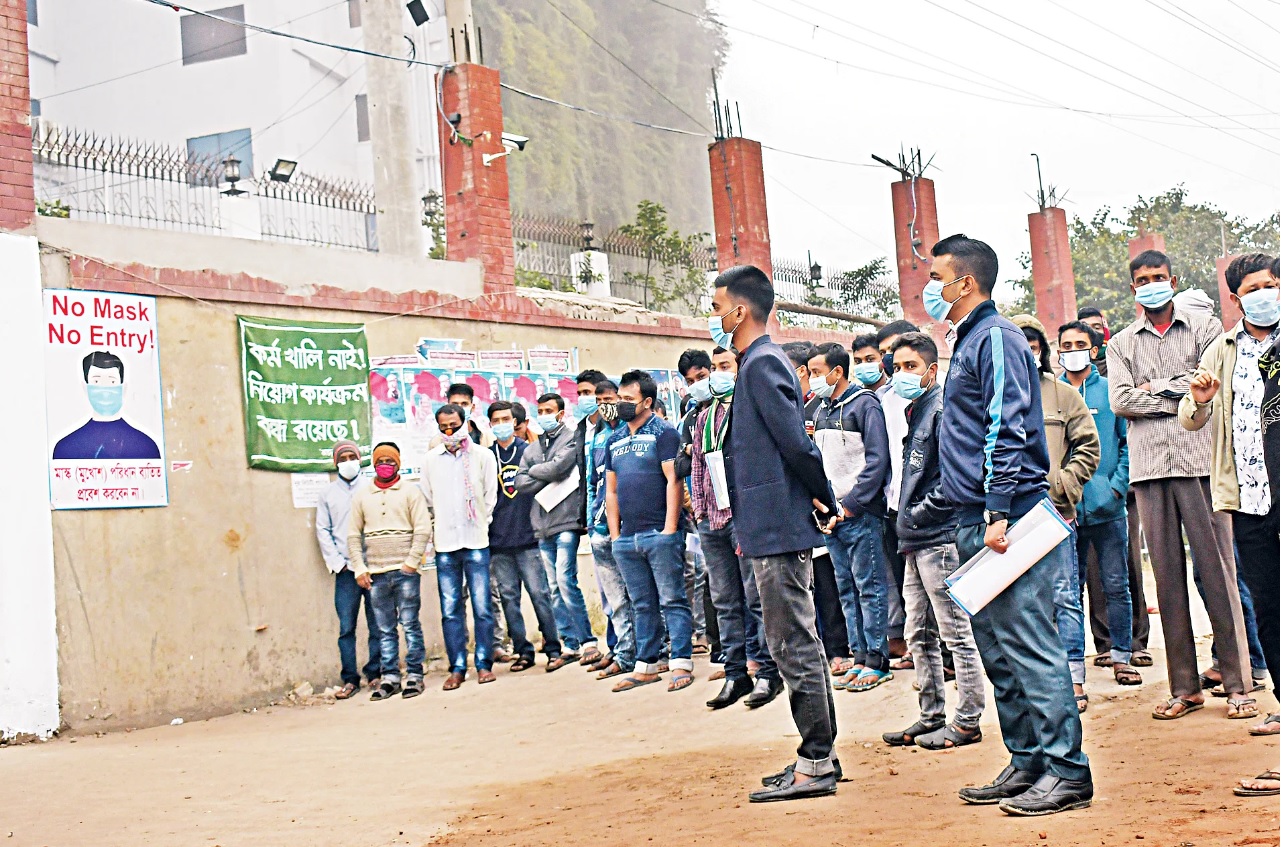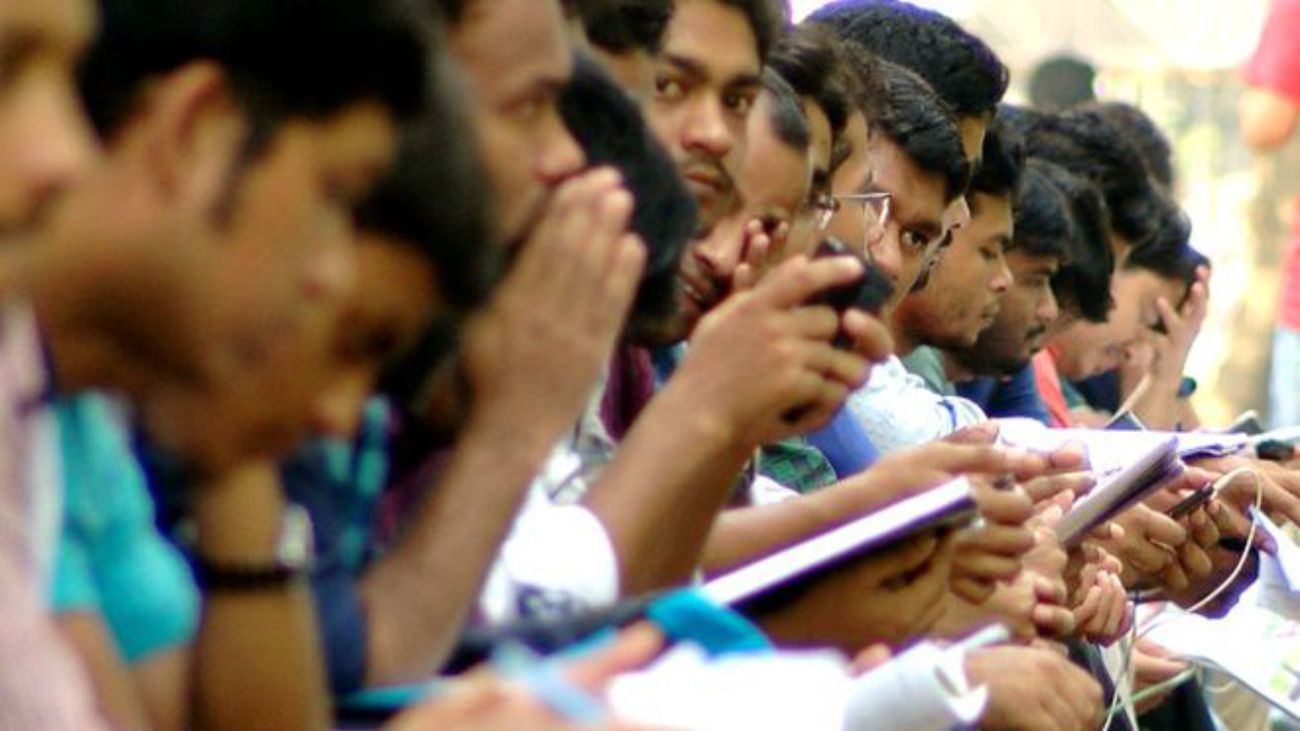No good news in job creation

Before it turned into a full-fledged mass uprising that ousted the Awami League-led regime and ultimately ushered in the interim government last year in August, the protest was driven by demand for employment at its core. Yet, a year on, the promise of better job prospects remains unfulfilled.
Public job circulars have been few and far between, forcing thousands of university graduates into fierce competition for government posts, as in previous years.
Over the past year, many industries have struggled to keep production lines running, let alone expand or open new units, according to bank lending and capital machinery import data. This meant fewer job vacancy notices on factory gates.
Meanwhile, the number of Bangladeshis going abroad for work has fallen by nearly a quarter compared with the previous year.
On the entrepreneurship front, small manufacturers, already constrained by limited financing, have also seen costs rise and sales slump amid persistently high inflation.
Since the interim government took charge in August 2024, the focus has mostly centred around recovering the frail economy. The central bank has kept monetary policy tight to blunt the inflationary curve hovering around a double-digit level.
This tightening made bank loans costlier for private sector borrowers, impacted investment and, in turn, job creation.
Besides, a deteriorating law and order situation and political uncertainty in the early months following the uprising are also to blame for preventing many entrepreneurs from expanding their investments.
Over the months, the fight to cool off spiralling prices grabbed the main focus of the authorities, with low private investment and slower job creation becoming the opportunity cost.
Government initiatives to reduce the skills gap through a need-based education system would have been a necessary step that required no such sacrifice, but the plan remained out of sight.
The only positive development was that Labour and Employment Adviser Brigadier General (Retired) M Sakhawat Hussain recently said they would open a new employment wing in the labour ministry for job creation.
His announcement came amid the unemployment gloom hovering over the private sector, which provides the bulk of jobs in the country.
In the past decade, the number of factory workers continued to decline. The number of workers in industries fell to 1.2 crore in 2024 from 1.21 crore in 2013, according to the Bangladesh Bureau of Statistics (BBS) data.
With the decline in industrial employment, total employment fell by nearly 3 percent to 6.91 crore in 2024 from 7.09 crore a year ago, according to the BBS, which is yet to release recent data.
In 2024, overseas employment, which has helped ease domestic unemployment for years, also fell by 22 percent to 10 lakh. By May last year, more than 4 lakh people had gone abroad for work, according to the Bureau of Manpower, Employment and Training (BMET).
"On job creation, young people remain deeply concerned," said Prof Selim Raihan, executive director of the South Asian Network on Economic Modeling (Sanem).
They have seen no change in the situation, with more than 50 percent of applicants failing to get even an interview call in the past year, he said, citing a recent Sanem survey.
Raihan, also an economics professor at Dhaka University, said the biggest challenge is stagnation in the private sector. "Many businesses are not expanding, only maintaining current operations, making it difficult to create new jobs."
Low growth in private investment is reflected in sluggish credit growth by banks, which is now among the lowest in several years. Imports of capital machinery and raw materials have also declined.
According to Raihan, political stability has not truly returned. Incidents of mob violence and the government's failure to properly mitigate law and order concerns through strong administrative measures have deterred both domestic and foreign investors.
"Job creation was a central issue in the July uprising. But the government has not been able to show any significant success in this area," said the economist. "None of their steps over the last one year have stimulated private investment."
He said skills mismatch is a major issue, with a wide gap between what students learn and what the job market demands. No significant moves towards education sector reform have been seen over the past year.
"I believe this was a major missed opportunity. Had we made progress in these areas over the past year, we could have created pressure on the next government to act," he added.
The government has set a target to create 15,000 new entrepreneurs in the small and medium enterprises sector over the next three years. It also plans to distribute Tk 1,000 crore in loans to 10,000 entrepreneurs in the cottage, micro, small & medium enterprises (CMSME) sector, including women entrepreneurs, and connect 3,000 women entrepreneurs.
As part of the interim government's efforts to address unemployment, the FY26 budget aims to raise the youth loan ceiling to Tk 2 lakh for trained individuals and Tk 5 lakh for successful entrepreneurs, as well as allocate a Tk 100 crore fund for youth.
The government also intends to train and provide credit support to 9 lakh young people by December 2028. Freelancing training has already begun in 48 districts, targeting 28,800 educated but unemployed individuals.
In a positive development in May this year, Japanese authorities and businesses announced plans to recruit at least 1 lakh skilled workers from Bangladesh over the next five years.
The government has formed a labour reform commission, headed by Syed Sultan Uddin Ahmed, to recommend reforms to ensure labour rights and improve worker welfare.
Ahmed said that after the report was submitted, a technical committee was formed to prepare for implementation, which will take time.
He said it is necessary to form a separate department at the labour ministry dedicated to employment research, so that employer demands can be properly understood.
He also called for better coordination among government agencies, skills development bodies, industry associations, academics and trade unions, but noted that such cooperation has yet to be seen.
"There is not much improvement in creating jobs, although young people need jobs badly," added Ahmed.
Labour and Employment Adviser Brig Gen (Retired) M Shakhawat Hossain said although the ministry is called the Ministry of Labour and Employment, it has no dedicated employment wing.
He has ordered the creation of one, and work is underway, but it may not be completed during his tenure because of red tape.
Asked about the need-based education system, he said it was "definitely" necessary but was a long-term reform that would have to be undertaken by the next government.




 For all latest news, follow The Daily Star's Google News channel.
For all latest news, follow The Daily Star's Google News channel. 




Comments